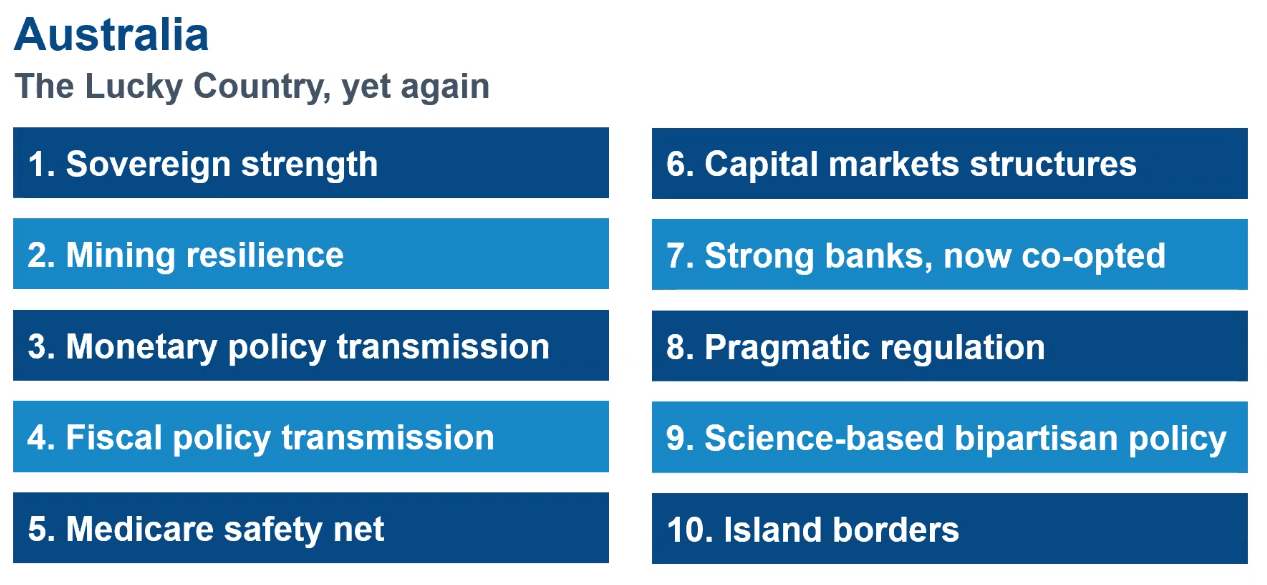10 reasons why Australia is the lucky place to be in a crisis (and 7 stock ideas to boot)
Imagine making the tough choice between forcing yourself to work and make ends meet or staying at home at the cost of going broke. Welcome to the United States of America, where the concepts of paid sick leave (for the majority) and free universal healthcare don’t exist.
Yet the safety net of Medicare is one of 10 big reasons that make Kate Howitt from Fidelity International optimistic that Australia will emerge from COVID-19 stronger, faster, and healthier relative to the U.S. and other countries.
I summarise the dash of optimism Kate provided for Australian investors at a webinar yesterday, some of the risks she sees ahead and how she is positioning the Fidelity Australian Opportunities Fund.
Reasons for optimism

1. Sovereign strength
In a similar vein to the 2008 Global Financial Crisis, Kate says that Australia entered COVID-19 from a position of budgetary strength.
“When you look at the national balance sheet we have low levels of outstanding debt and when you look at our P&L our budget deficit going into this was in good shape.”
2. Mining resilience
While a large part of our economy is reliant on tourism and high-value exports such as education, the mining sector is holding up as a pillar of strength.
“Those services sectors have been hit really hard, but we do have a very large component of our economy in mining which is just still trucking along. Production levels remain high and prices remain high, so that’s providing a really good benefit to the economy.”
3. Monetary policy transmission
When the RBA cuts rates, the vast majority of borrowers benefit by seeing repayments fall quickly because most loans in Australia are on variable pricing at the short-end of the yield curve, she says.
In the U.S. most loans are fixed, so when the Fed cuts rates there is no actual benefit transmitted to households. Instead, the U.S. relies on the convoluted process of quantitative easing to reduce borrowing costs over time.
4. Fiscal policy transmission
Because the Australian Government has invested in digital infrastructure and tied our access to services such as the ATO and Centrelink to myGov, it is relatively quick and easy for benefits such as stimulus and support payments to flow through directly into households electronically.
“In the U.S. they’re waiting for printed cheques. They also have the Small Business Administration program which was so swamped that the website crashed, and there have been instances of rorting whereby hedge funds are trying to take up support meant for small businesses.”
5. Medicare safety net
At its core COVID-19 is a health crisis and thus access to free, quality healthcare and the rights and confidence of Australians to take a sick day without getting fired or going broke are intertwined with the monetary and fiscal response.
“Medicare as a safety net is a terrific thing at the best of times and it’s clear we have one of the best healthcare systems in the world overall. But now this has really come to the fore. In the U.S., which doesn’t have paid sick days or free healthcare, the most common reason for personal insolvency has been an unexpected medical expense. We just don’t have this. It’s not just a wonderful humanitarian thing but the fact that we can rely on getting the healthcare should we need it but economically a very important aspect of our structure.”
(Ed's note: Interestingly, the Los Angeles Times yesterday published this article (aptly titled “America’s pathetic sick leave policies are killing our coronavirus response”) on why this is so important and how it will impede Americans' ability to get tested and get COVID-19 under control.)
6. Capital market structures
Kate says that the interplay of superannuation and the ability of companies to raise money via deals like share purchase plans and placements allows businesses to obtain capital quickly to fix balance sheets.
“Super is a wonderful shock absorber for the Australian economy and equity markets. We’re asking super to play a lot of roles right now – we’re asking it to take up a lot of the recapitalisations coming through and we’re asking it to be the piggy banks for households in financial distress.”
Kate expects that super will play a key role in Australia’s economic recovery as the government encourages spending on nation-building projects.
7. Strong banks
The Big Four have spent more than a decade to build up their financial strength to the “unquestionably strong” level directed by APRA and also improved their operational resilience, she observes.
"That means that now the government can turn around and say, hey, we'd like to harness the power of your ability to execute and drive funds into the border economy to get loans o individuals and businesses who need it. That is a real strength for us. Again in the US banking is very fragmented and It's under state-based regulation so it’s very hard to use banks as an arm of policy."
8. Pragmatic regulation
While the ACCC is a powerful competition watchdog, Kate says it understands that COVID-19 requires large businesses to co-ordinate policies and has allowed them to share knowledge/best-practices so that they can work together to protect staff and customers across the business landscape.
9. Science-based bipartisan policy
Kate observes that some countries are “falling apart” due to worsening polarisation whereas the Australian government and public in turn have trusted in the advice of health experts. This is contributing to the health outcomes, as evident in the data for testing, infections and deaths.
10. Island border
Call it luck but we’ll take it; like Taiwan and New Zealand, Australia has found it easier to control COVID-19, unlike landlocked or bordered countries who are seeing second waves of infections coming from travellers.
Risks to the outlook
While it appears that we’re moving out of the eye of the storm, Kate says it’s still too cloudy to assess the extent of the economic fallout. She alluded that the prevailing situation is akin to “dynamite fishing”.
“At first the little fish die and then float to the service. Then the medium fish and then eventually there will be a big whale that would have turned out to die and then floats to the surface.”
While stimulus measures would help, there will be companies that do not make it through.
She’s also in two different minds about the current rebound will play out:
- The market has taken all negative and positive factors into account effectively and is looking 6-12 months ahead, in which case valuations look reasonable, or
- The market is looking “five minutes ahead” and relying on very specific data points; which if turn out to show the economy and earnings are being hit harder than expected, then it may spell bad news for this rally.
“That’s when you see market start to roll over… there's a lot of companies out there with stale earnings estimates and where the company has withdrawn guidance, so estimates are not really reflective of what we really think is going to happen. So maybe when those come out share prices track them down.”
7 stock ideas
Boiling it down into what it means for portfolio positioning, Kate has structured her investments around four different themes.
Stocks that have a bridge to 2022
These are companies that will benefit if there is a prolonged shutdown such as Coles Group (ASX:COL) or see activity pop when the economy comes back to life, like Lovisa (ASX:LOV).
“Now obviously cheap earrings are not an essential service and so Lovisa's business has been suppressed. Interestingly, they are keeping a lot of their stores open in Australia because of their JobKeeper. So you want to also have an eye on stocks that will recover when the economy comes back to life.”
Stocks with the ability to withstand deflation or inflation
These are stocks that will be agnostic to whether the prevailing environment is inflationary or deflationary like CSL (ASX:CSL) and Evolution Mining (ASX:EVN).
"Now inflation or deflation is an interesting question. To guard against that you want to have the stocks with pricing power, such as CSL and blood products. Or commodity producers such as Evolution, a gold mining stock and gold has done very well in this period, we think gold is important."
Stocks that don’t rely on endless cheap capital
Kate is avoiding stocks based on the Uber or WeWork model of relying on endless cheap funding. However, quality cyclicals with strong balance sheets and operating discipline like BlueScope (ASX:BSL) are well-positioned to emerge on the other side.
Stocks that provide an important community service
Within this theme she holds companies like Ramsay Health Care (ASX:RHC), which will rebound as elective surgeries resume and Commonwealth Bank of Australia (ASX:CBA), which is the best capitalised out of the Big Four to ride out the storm.
Stay up to date with Kate's latest insights
Want to see previous thought pieces from Kate or get notified when she publishes wires in future? Follow her profile here.
Not already a Livewire member? Sign up today to get free access to investment ideas and strategies from Australia's leading investors.
3 topics
7 stocks mentioned
1 contributor mentioned

